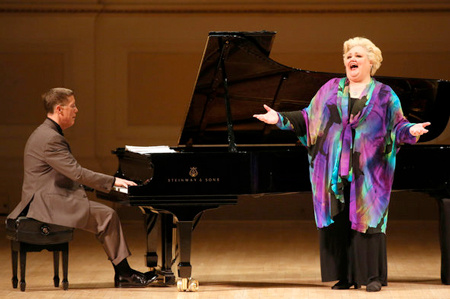by Daniel Hathaway

That wasn’t the only innovation on Tuesday. Noting that she was tired of seeing the tops of the audience’s heads rather than looking into their eyes while she was singing, Blythe said that she had decided to dispense with printed texts. Instead, she and Jones would read the words of the songs before she sang them.
They did that beautifully, beginning with Pierre Ronsard’s texts set by Francis Poulenc in 1925 as Poèmes de Ronsard, and continuing with Charles Baudelaire’s symbolist verses set by Léo Ferré in the two songs La Vie antérieure and L’Invitation au voyage, both dating from 1957. Freed from scanning the texts and flipping pages, the audience could follow every nuance in Blythe’s richly imagined singing and Jones’s sensitive playing.
Three Jacques Brel cabaret songs moved the proceedings out of the salon and into the smoky bars of Paris. After wonderfully lyrical performances of Les Pieds dans le ruisseau and the well-known Ne me quitte pas, Blythe and Jones turned to an earthier text: Amsterdam. Here, Blythe delivered the narrative of the seamy lives of sailors in that port city with a raw power that was utterly transfixing.
After intermission, W.H. Auden’s and Benjamin Britten’s 1937 collaboration, Cabaret Songs, reeled the mood back a bit in the direction of a light-hearted concert song cycle, though “Funeral Blues” capped the set off with a moment of thoughtful solemnity.
Then Stephanie Blythe announced that she and Warren Jones would dispense with reading the words before five Noel Coward songs. “There will be no more recitations: these are lyrics,” she said. And a delightful range of them, including Zigeuner, a bit of Viennese operetta; Nina, a parody of Cole Porter’s Begin the Beguine; the coyly ambiguous Mad About the Boy; the humorous but pointed Don’t Put Your Daughter on the Stage, Mrs. Worthington; and finally the aptly titled The Party’s Over Now.
The warm ovation called for another song, and Blythe gently nudged the audience into joining her in Irving Berlin’s Always, a 1925 wedding gift for his wife, and a song that obviously struck a common chord with the crowd. Can you imagine a nicer way to end such an intimate evening?

Published on ClevelandClassical.com February 9, 2016.
Click here for a printable copy of this article


